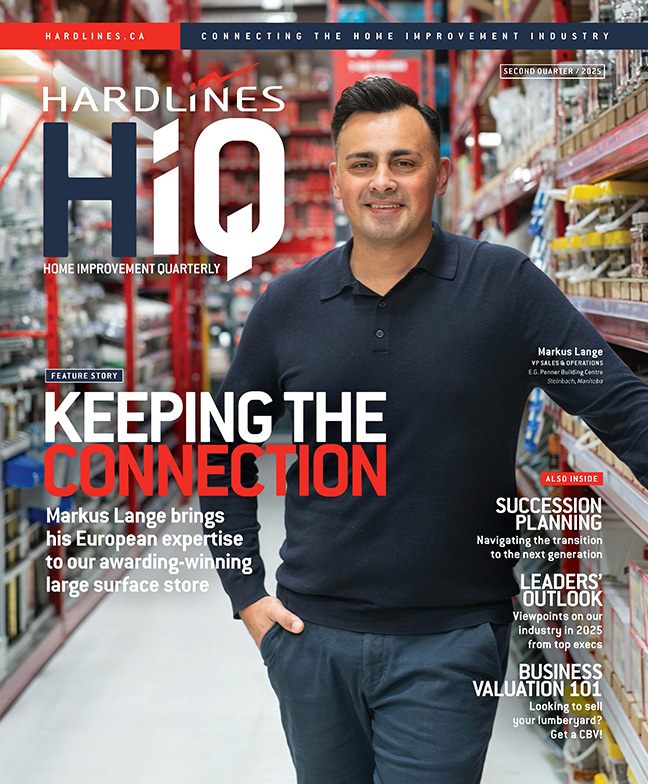T his month we talk with Walter Pranke, vice president, human resources at Lee Valley Tools, a chain of tool and gift stores based in Ottawa.
his month we talk with Walter Pranke, vice president, human resources at Lee Valley Tools, a chain of tool and gift stores based in Ottawa.
The job of the HR department certainly became front and centre during the pandemic. But as its importance has grown, so has the definition of the role an HR department must play to be an effective part of any growth-oriented company.
HR was once viewed as the “personnel department” through which managers could generate employee reviews and keep track of a staffer’s performance, both good and bad. But that model is outdated. Today, the importance of employee wellness has become crucial to the workings of a company.
“The HR department has become much more than a personnel department,” says Walter Pranke, VP of human resources at Lee Valley Tools. “An HR leader has to be very business savvy, with more than simply an HR mindset.”
Pranke says that HR should be an integral part of a management team’s planning. But it has to earn that spot by being focused on the overall success of a company. “You need to be able to provide solid ideas that will help grow the business.” He urges fellow HR leaders to “learn the business” so their input will add value in concrete ways and contribute to the overall performance of a company.
Pranke says it’s important to stay on top of technology that can help streamline and strengthen the HR role. He’s in the process of implementing a new platform that will help connect Lee Valley’s employees at 18 stores across Canada—and employees working remotely—with virtual, face-to-face access.
The process of pitching this technology, Pranke says, required him to have a good sense of the wider business advantages the platform could bring. “Now we will have a much more centralized and cohesive model for training.”
HR has moved well beyond its “personnel department” mindset. “Management needs to think of including HR in more conversations about the growth and future of the business,” Pranke concludes.

 When it comes to hiring, it’s a buyer’s market out there. Where companies once called the shots on how and when a new hire was made, new realities brought on by COVID have left many people looking harder than ever at what a company stands for before choosing to join it.
When it comes to hiring, it’s a buyer’s market out there. Where companies once called the shots on how and when a new hire was made, new realities brought on by COVID have left many people looking harder than ever at what a company stands for before choosing to join it.
 Martina Pileggi is senior director of human resources for the Hillman Group Canada, a fastener producer for the hardware, automotive, plumbing, and electrical markets.
Martina Pileggi is senior director of human resources for the Hillman Group Canada, a fastener producer for the hardware, automotive, plumbing, and electrical markets. With StatCan indicating one million job vacancies in Canada since the third quarter of 2021, recruiting young workers can require creative thinking to capture their attention. That’s just what Lowe’s Canada brought to its ad campaign to promote working at its stores this spring.
With StatCan indicating one million job vacancies in Canada since the third quarter of 2021, recruiting young workers can require creative thinking to capture their attention. That’s just what Lowe’s Canada brought to its ad campaign to promote working at its stores this spring. The world has now endured two full years of the COVID pandemic, which turned work habits sideways as companies learned to adjust. But even as restrictions lift, fully half of Canadian office workers have yet to return to their work spaces, and that’s not likely to change much, according to new research.
The world has now endured two full years of the COVID pandemic, which turned work habits sideways as companies learned to adjust. But even as restrictions lift, fully half of Canadian office workers have yet to return to their work spaces, and that’s not likely to change much, according to new research. Roy Prevost is an international speaker, futurist, and business coach. He works with retail teams to help them compete better. One of the areas he focuses on is how a company can shape its core values.
Roy Prevost is an international speaker, futurist, and business coach. He works with retail teams to help them compete better. One of the areas he focuses on is how a company can shape its core values.